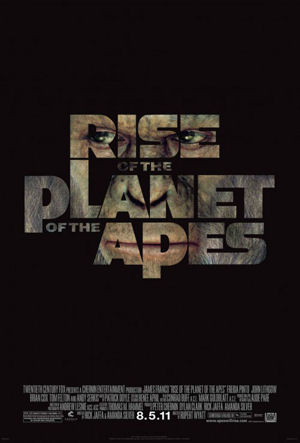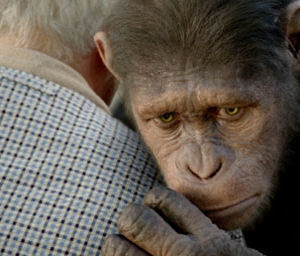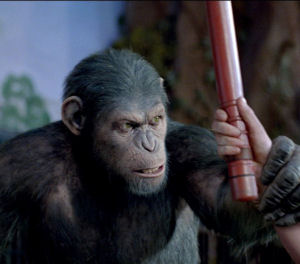Movie Review: Rise of the Planet of the Apes
[AUTHOR'S NOTE: I have written a more recent re-review of this movie. Check it out here.]
 | | Spoiler: Apes will rise! |
The most surprising thing about Rise of the Planet of the Apes is that, despite it telling a similar story to the fourth film in the original franchise, Conquest of the Planet of the Apes, it actually has more in common with the movie that started it all. Don't be mistaken; this is a reboot, in that it charts its own path and ignores the continuity of both the original series of films and the Tim Burton experiment from 2001. However, if you boil it down, you'll find in its DNA the exact same story that made the franchise so popular in the first place, only from a different point of view. Indeed, Rise of the Planet of the Apes is the most faithful and clever retelling of that story since Charlton Heston pounded the Earth beneath a broken Statue of Liberty back in 1968.
However, it is more than just a retread over familiar material. This movie is also an astonishing achievement in bold filmmaking. Most of the story relies on the audience having a deep emotional connection with a visual effect, and there are lengthy scenes in the film where not a single word of dialogue is spoken. It's a daring decision, but one that largely pays off. Having said that, the movie is not flawless. It doesn't always seem to know what story it wants to tell, and a handful of characters are painfully one-dimensional clichés. Still, the positives far outweigh the negatives, and this is sure to be a successful cap for 2011's summer movie season.
After an opening sequence that recalls the original movie, the narrative focuses on Will Rodman (James Franco), a scientist developing a drug that promises to repair and grow brain cells. This drug, ALZ, could potentially cure Alzheimer's disease, among much else. Will tests the ALZ on apes, and it appears to do wonders for one female ape in particular, Bright Eyes. However, while Will brags about his accomplishments to a group of investors, Bright Eyes goes on an ill-timed rampage that ends not only in her death but in a serious downgrade in Will's research. While cleaning up the mess, Will discovers that Bright Eyes was only defending her newborn, Caesar, whom he takes home to his Alzheimer's suffering father, Charles (John Lithgow). After several years of living and growing with the family, Caesar gets taken by Animal Control after attacking a neighbor who was being abusive to Charles. This is when the movie belongs to Caesar as he adjusts to life in a cage and plots his escape.
 | | The emotional connection is a remarkable accomplishment |
This is also when the movie starts to feel a lot like 1968's The Planet of the Apes. There are several lines of familiar dialogue and situations that will give fans a case of quasi-déjà vu. Caesar is subject to all manner of abuses, including getting sprayed with a firehose and being insulted by a young zookeeper, Dodge Landon (Tom Felton). In effect, Caesar is Charlton Heston's Taylor, if Charlton Heston had been an ape. You truly feel for him as he scrawls a window on the walls of his cell, longing for home, and you root for him when he has to prove himself to his fellow ape prisoners. Once again, Andy Serkis, who "plays" Caesar, blurs the line demarking where acting ends and animation begins, and many will debate whether or not he deserves to be nominated for an acting award on the merits of his amazing character here.
If the CG weren't exceptional or if the screenplay had been more hand-holding, the movie would fall apart at this point, because the audience would never connect with Caesar and the film would climax in an orgy of visual effects with no emotional punch. However, the filmmakers make sure that the climax is absolutely deserved and awesome, by ensuring that everything leading up to it is heartfelt and relatable. I wouldn't call the story realistic or original, but it does an amazing job suspending disbelief so that it can tell the fantastical story about apes rising up that audiences are paying to see. The first half of the film might seem a little slow to people impatient for ape-running-amok action, but if the story had skimmed over Caesar's childhood or Charles' struggles with Alzheimer's, this movie would be no more remarkable than Deep Blue Sea or I Am Legend.
It's a delicate balance that is not to be underestimated. Go too far in one direction and you have a mindless action movie, but go too far in the other direction and you have a soap-opera that ends in incomprehensible nonsense (like 2003's Hulk). Rise of the Planet of the Apes manages to avoid these pitfalls, pulling off a movie that has equal amounts of thrilling action and satisfying poignancy. It's the kind of storytelling that catapulted Steven Spielberg, which makes it all the more striking that this movie is directed by Rupert Wyatt, a virtual unknown.
 | | Even with a bigger wand, Draco is still a jerk, and Caesar doesn't take the abuse like Harry does |
Unfortunately, the film does stumble in a few places. Many of the human characters in the film aren't well-developed. For example, Will's boss, Steven Jacobs (David Oyelowo), is the most ridiculous charicature of a greedy capitalist this side of Mr. Krabs, and Tom Felton's young punk feels like he just walked out of an eighties movie in which he had to bully the local ethnic restaurant owner into moving out so that an evil corporatist could use the building as a cover for his illicit drug business. I have no problem with greed or cruelty being defining characteristics, but when that's absolutely all there is to your characters, they will feel more like cartoons than actual people. Even James Franco seems a little underused here as Will, but not as badly as his veterinarian girlfriend, Caroline (Freida Pinto), who doesn't seem to serve any purpose whatsoever.
Granted, better developing these characters might have taken more away from Caesar, which could have ruined the film. This is compounded by the tug-of-war that occurs during the film's second act, in which the script can't seem to decide if it's telling Will's story or Caesar's. Will's story is certainly relevant, but it could have been made a little leaner (by getting rid of the girlfriend, for example) to give Caesar a bigger spotlight or to help flesh out some of the ancillary characters. This is Caesar's story, and if the screenwriters had agreed to that from the start, they might have found better ways to ensure it. The best illustration I can make is (MAJOR SPOILER ALERT!) Charles' death, which is a strong emotional moment that goes completely unwitnessed by Caesar.
I don't want to downplay the cleverness of the script, however. Despite its flaws (and some silly science), the plot is surprisingly intelligent. There are some choices that seem completely arbitrary and irrelevant that become important in the end. It is clear that the writers had envisioned the last page of their script before writing the first, and that's crucial for a story as tightly woven as this one. It also honors the original franchise in ways you don't necessarily expect, while simultaneously setting the stage for its own potential sequels. Here's hoping we get some and that they keep to the high standard set by this reboot. It's probably not a success story equal to Casino Royale or Star Trek, but Rise of the Planet of the Apes continues to prove that, when done right, a reboot can be brilliant, entertaining, and extraordinary. At the very least, it helps us forget Tim Burton's misstep.
FINAL SCORE:





If you're even remotely interested in seeing it, I recommend going to the theater as soon as you can.
|
-e. magill 8/9/2011
|